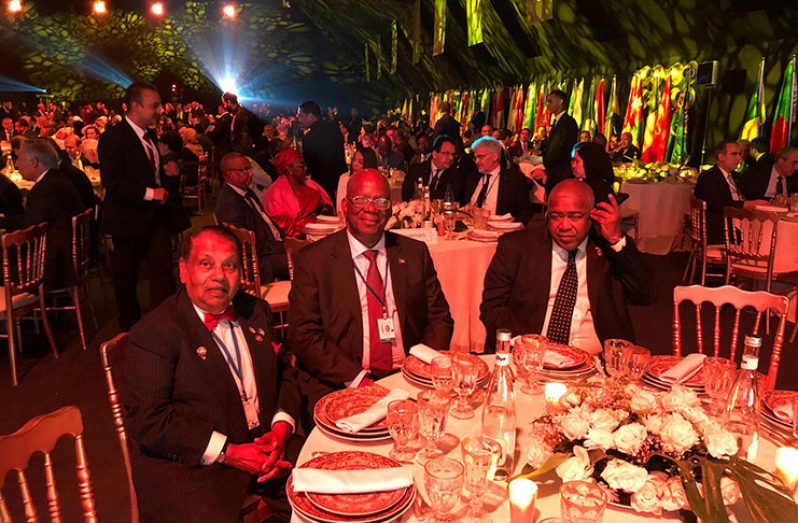– Minister Jordan tells Islamic Development Bank
GUYANA has asked the Islamic Development Bank (IsDB) to consider investing in three mini-hydropower systems and road links in hinterland communities, Finance Minister Winston Jordan said in his address at the 44th Annual Meeting of the Islamic Bank Group in Marrakesh, Morocco.
The country has also made a pitch for the IsDB to invest in the construction of several potable water and sanitation systems, a reverse-linkage programme in halal ecosystems, and a reverse-linkage programme in technical and vocational training. The latter will place emphasis on addressing the critical needs of the emerging oil and gas sector.
Minister Jordan said the proposals have been made at a time when the IsDB is working with Guyana to develop an appropriate development agenda, as well as a plan of action and implementation.
“Guyana looks to the esteemed President of this august institution and his skilled and hard-working staff to support our ambitious programmes, and we look to your respected Excellencies to formulate the policies to support the work of the IsDB among its member countries,” he said.
The finance minister noted that there are thousands of years of experience and tested technologies that exist in this Region, from which Guyana and other member states can benefit.
“In the pipeline are opportunities for a waqf investment programme to support our elder-care initiatives; highway construction to open thousands of hectares of agricultural land, while linking communities and markets; and marine-port development to improve shipping and competitiveness,” the finance minister said.
TREMENDOUS SUPPORT
Since Guyana became a member of the IsDB in 2016, the country has received tremendous support. In 2018, three operations were approved, enabling Guyana to benefit from a grant to upgrade and modernise the Palms; a US$20M installment sale operation to expand and upgrade the electricity transmission and distribution system, thereby leading to improvement in the quality and reliability of the energy supply received by customers; and a reverse linkage programme (funded by Malaysia (US$0.3M), the IsDB (US$0.28M) and Guyana (a matching amount)), to make the rice industry more resilient, productive and competitive.
Additionally, in 2018, Guyana received a programming mission to begin preparation for several new projects to respond to the current challenges that are rooted in insufficient national resources and a diminishing pool of multilateral and bilateral support.
Noting that Guyana is open for business, the finance minister told the Islamic Bank Group that the country looks forward to its development partners, including the IsDB, to build on its regional comparative advantage in natural-resource endowment, including pristine forests, abundant fresh water, large arable agricultural lands and a wide variety of flora, fauna and mineral resources.
He noted that Guyana’s strategic geo-physical and geo-political location within Latin America and the Caribbean offers a convenient gateway for public and private sector partners to collaborate and invest, thereby expanding their market opportunities and access scarce resources. He said to realise its potential, it is imperative for the country to develop its climate-resilient infrastructure, and food and energy security. He said the country also needs an empowered and skilled labour force and increased capacity for entrepreneurship, innovation and creativity.
INCONVENIENT TRUTHS
Meanwhile, on the global front, Minister Jordan told the world leaders that since the last annual meeting, there have been some “inconvenient truths” of globalisation’s free trade agreements, which have become more evident.
“The developed economies have championed trade without attention to people; and trade arrangements have been extended into national borders, with the consequential reshaping of domestic regulations and the appropriation of indigenous knowledge for profit,” he said.
He said now the world begins to reap the whirlwind of a global marketplace that bypasses distributional justice with disruptions in geopolitical stability and defaults on agreements to govern the global commons.
“We see fragmentation, instead of collaboration and unity, and the rise of a chauvinistic brand of nationalism,” he stated.
Minister Jordan told the IsDB member states that it is clear that business as usual will not suffice. “We must applaud the vision of the President, who is steering the Islamic Bank Group on a path that recognises the importance of the environment, and to building partnerships and south-south relations towards the realisation of economies that are resilient, that champion trade with the awareness that people are central to all our policies, programmes and actions; and that address labour market failures by targeting job creation and global value chains.”
He added: “These programmes and financial instruments of the IsDB will not deepen societal divisions nor undermine domestic social bargains, in the way that implementing current World Trade Organisation (WTO) and banking rules seem to be doing.”
He urged the IsDB and its partners and member states to find ways for countries to leapfrog into the 21st century and beyond with clear-sighted and even prescient recognition of the necessity of adjusting to emerging global imperatives and changes.
The IsDB AGM commenced on April 3 under the theme, “Transformation in a changing world: The road to SDGs.” It ended on Saturday.




.jpg)











